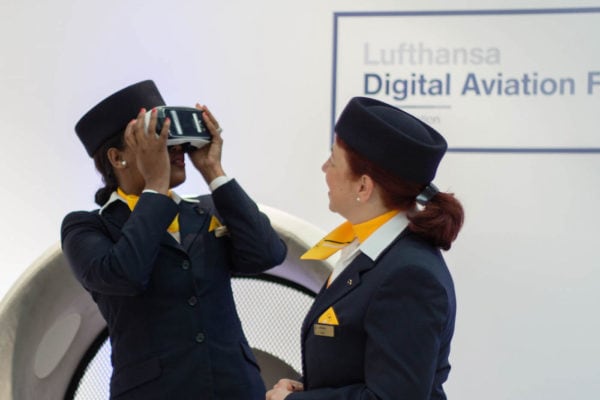Lufthansa Aims to Become “Most Digital Aviation Group” in 2017
Share

APEX Insight: Lufthansa Group companies gathered at Frankfurt Airport yesterday to work toward their goal of becoming “the most digital aviation group.”
On the heels of CES’ tech takeover of Las Vegas, Lufthansa Airlines and its subsidiaries yesterday converged at Frankfurt Airport, transforming the hub into a forum on digital aviation.
“I think, by now, we all agree that we live in a digital world,” said chairman and CEO Carsten Spohr, who lauded the airline’s reputation for being “the most digital airline.” The goal for 2017, Spohr says, is to become “the most digital aviation group.”
Digital innovations on display included Avegant Glyph headsets, an artificial intelligence-driven chatbot named Mildred and one of five Inmarsat GX radome-equipped Airbus A319s, ready for take off. Lufthansa’s FlyNet Internet service, powered by Inmarsat Ka-band satellite connectivity, is now online and will be available to customers in three service packages: FlyNet Message, FlyNet Surf and FlyNet Stream. Delegates from the press tested streaming capacity on the service’s inaugural flight, watching a live ground-to-air teleconference.

With four days downtime required for radome installation by Lufthansa Technik on each aircraft, Lufthansa aims to have 10 A320s equipped by the end of the first quarter and 100 aircraft by spring, completing the full-fleet roll out in roughly 15 months. Austrian Airlines has also launched its service, and will have 31 aircraft equipped by April this year, while Eurowings plans to begin installation early spring and equip its 69 aircraft by end of summer.
But for Spohr, who shyly admits preferring to disconnect while he’s flying, passenger connectivity is just a piece of Lufthansa’s sweeping digital strategy. “When we think about marketing, it truly has changed from communication only in non-digital environments to being present in a digital world via various channels,” he says, adding that the airline’s head of Marketing now spends at least 50 percent of his time devoted to cultivating the airline’s digital presence.
Lufthansa Group’s SMILE program, which takes its name from the cheerful acronym for “Surpass My Individual Lufthansa Experience,” focuses on using customer data to provide personalized marketing and services. “We’re using a multitude of different customer data points, and we’re using a lot of market research, which we’ve always done, but we’re matching that very deeply with ethnographic research,” explains David Doyle, SMILE’s program director.
“We don’t believe that digitalization will create job losses.” €” Carsten Spohr, Lufthansa
A recent SMILE initiative involved deploying 200 Bluetooth beacons at Munich Airport that can read digital boarding pass data as travelers pass by, and send offers for lounge access, via Lufthansa’s app, to those who have more than 65 minutes before departure.
Spohr affirms that the group’s digital ambitions will not threaten jobs, adding that the group will add 3,000 personnel over 2017, including 2,200 flight attendant positions. “It’s not either or,” he says. “We don’t believe that digitalization will create job losses, but rather we believe that it will create additional jobs because it will make Lufthansa bigger and more successful.”


